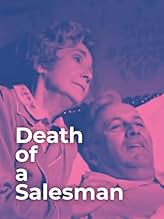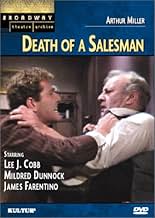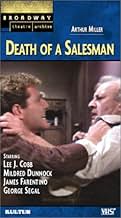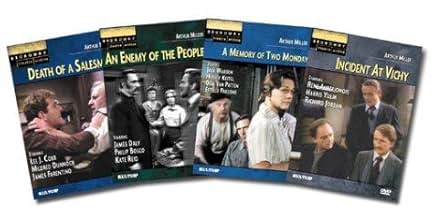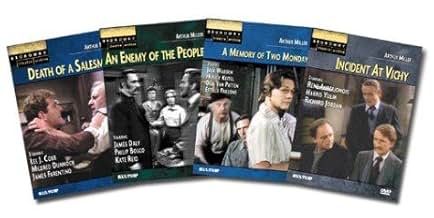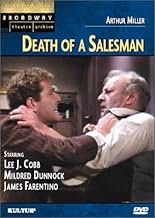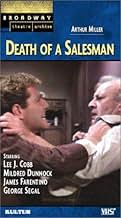Ajouter une intrigue dans votre langueAn abridged award-winning television adaptation of a famous play about an aging travelling salesman who's on the verge of a nervous breakdown. His job is gone, and his family hates him for n... Tout lireAn abridged award-winning television adaptation of a famous play about an aging travelling salesman who's on the verge of a nervous breakdown. His job is gone, and his family hates him for never being there. He tries mending things with them.An abridged award-winning television adaptation of a famous play about an aging travelling salesman who's on the verge of a nervous breakdown. His job is gone, and his family hates him for never being there. He tries mending things with them.
- Réalisation
- Scénario
- Casting principal
- Récompensé par 3 Primetime Emmys
- 5 victoires et 8 nominations au total
Marc Fiorini
- Stanley
- (non crédité)
Avis à la une
Arthur Miller's play is an American classic, timeless and poignant. I've seen three film/TV and one stage version of the play. Lee J. Cobb's performance is the most powerful and frightening, comparable to his earlier performance in "12 Angry Men". As far as the character of Willy Loman and the sales profession a recommended viewing of "Glengarry Glen Ross" would be enlightening.
This was my first meeting with the play. After finishing it, I felt satisfied, but also far from finished with the play itself. I immediately wanted to see other versions of this, both to compare with this, and to enjoy the great writing. As this is an abridged (by the author himself) version, I'm obviously curious as to what more there is to it. I never felt anything missing.
Lee J. Cobb was made for a role like this. The vulnerable, temperamental and old fashioned man that's grasping for happiness. I can imagine how intimate it must have been to see him act this on stage, and I'm happy that at least we have this TV version of his performance.
The touches done to make this a TV movie instead of a filmed play, did not really add much to the movie. The locations still felt like sets and the performances were good, but theatrical. The transitions, dialogue happening over each other, etc, that is only possible in an edited medium like this, did not add much to the story.
Lee J. Cobb was made for a role like this. The vulnerable, temperamental and old fashioned man that's grasping for happiness. I can imagine how intimate it must have been to see him act this on stage, and I'm happy that at least we have this TV version of his performance.
The touches done to make this a TV movie instead of a filmed play, did not really add much to the movie. The locations still felt like sets and the performances were good, but theatrical. The transitions, dialogue happening over each other, etc, that is only possible in an edited medium like this, did not add much to the story.
When "All My Sons" became too hard to take and critics began to call it a mere timepiece, Arthur Miller wrote another. Instead of life from the well-to-do point of view, he would wander to the other side of the street and look back. "Death of a Salesman" is life from the working man's front porch. And what a telling it is!
Finally, Lee J. Cobb and Mildred Dunnock have one more opportunity together, this time recorded for the ages. And the rest of the cast, superb.
Dear television gods, please bring it back at least one more time. This is a piece that needs to be seen by each generation: a constant reminder of how great the temptation always is to live in greed at the expense of the common man. Thank you again, Mr. Miller, for your wisdom and haunting words.
Finally, Lee J. Cobb and Mildred Dunnock have one more opportunity together, this time recorded for the ages. And the rest of the cast, superb.
Dear television gods, please bring it back at least one more time. This is a piece that needs to be seen by each generation: a constant reminder of how great the temptation always is to live in greed at the expense of the common man. Thank you again, Mr. Miller, for your wisdom and haunting words.
The only slight reservation I have about this TV version of the play is the fact that it was clearly shortened for the medium. The greatest thing about this recording is that it preserves Lee J. Cobb's interpretation of the lead role. I was enrolled in a drama school in the early 60s, a time when several of our teachers had actually seen him in the 1947 stage play. They would frequently speak, in reverent tones, of the scorching great performance that Cobb delivered. This 1966 television revival makes Cobb seem all the more remarkable to me due to the nearly twenty year interval that had passed since the New York run of the play. No matter how great a performance he might have initially delivered, many an actor would have lost a lot of the original intensity in that span. On top of this, Cobb had experienced a battering ordeal at the hands of the House on Un-American Activities Committee toward the end of the run of the play. There is a fascinating story behind Cobb's development of the role. During rehearsals, the director was considering replacing Lee, as his work was not showing promise. The story goes that, at a critical point, Cobb had been staring at a crack in a wall in the rehearsal space. Suddenly he was seized by a strong sense of the character which immediately endowed his reading with uncanny feeling and intensity. Late in the run, it is told that the characterization took such a pervasive hold on the actor that he started to take it home with him, unable to snap out of it.
This is my favorite adaption of the play, "Death of a Salesman". The play itself is timeless and could be portrayed in a modern setting (with some updating). Willie Loman and his family will always exist as long as people in all walks or professions are perceived as being past their prime and a liability rather than an asset to society. It is a tragic episode in the life of a family that outgrow dreams and ambitions and must accept reality and human imperfection.
I have had arguments over the fact that I believed Gene Wilder played Bernard in this play before he became prominent in a movie career. This cast is unique with such excellent actors as Mildred Dunnock, Lee J. Cobb, George Segal, James Farrentino, Bernie Koppell and the remaining members of the cast.
I have had arguments over the fact that I believed Gene Wilder played Bernard in this play before he became prominent in a movie career. This cast is unique with such excellent actors as Mildred Dunnock, Lee J. Cobb, George Segal, James Farrentino, Bernie Koppell and the remaining members of the cast.
Le saviez-vous
- AnecdotesIn his autobiography "Timebends", Arthur Miller said that Lee J. Cobb was his favorite Willy Loman.
- ConnexionsFeatured in Role Model: Gene Wilder (2008)
Meilleurs choix
Connectez-vous pour évaluer et suivre la liste de favoris afin de recevoir des recommandations personnalisées
Détails
- Date de sortie
- Pays d’origine
- Site officiel
- Langue
- Aussi connu sous le nom de
- La muerte de un viajante
- Lieux de tournage
- Société de production
- Voir plus de crédits d'entreprise sur IMDbPro
Contribuer à cette page
Suggérer une modification ou ajouter du contenu manquant

